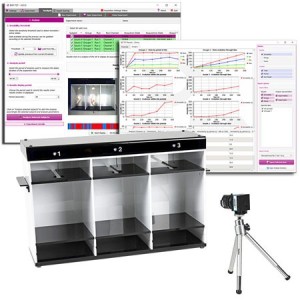Authors
Vincent Fournet, Gaetan de Lavilléon, Annie Schweitzer, Bruno Giros, Annie Andrieux, Marie-Pascale Martres
Lab
INSERM, Université Pierre et Marie Curie, Paris, France / Université Joseph Fourier, Grenoble, France
Journal
Journal of Neurochemistry
Abstract
Recent evidence underlines the crucial role of neuronal cytoskeleton in the pathophysiology of psychiatric diseases. In this line, the deletion of STOP/MAP6 (Stable Tubule Only Polypeptide), a microtubule-stabilizing protein, triggers various neurotransmission and behavioral defects, suggesting that STOP knockout (KO) mice could be a relevant experimental model for schizoaffective symptoms. To establish the predictive validity of such a mouse line, in which the brain serotonergic tone is dramatically imbalanced, the effects of a chronic fluoxetine treatment on the mood status of STOP KO mice were characterized. Moreover, we determined the impact, on mood, of a chronic treatment by epothilone D, a taxol-like microtubule-stabilizing compound that has previously been shown to improve the synaptic plasticity deficits of STOP KO mice. We demonstrated that chronic fluoxetine was either antidepressive and anxiolytic, or pro-depressive and anxiogenic, depending on the paradigm used to test treated mutant mice. Furthermore, control-treated STOP KO mice exhibited paradoxical behaviors, compared with their clear-cut basal mood status. Paradoxical fluoxetine effects and control-treated STOP KO behaviors could be because of their hyper-reactivity to acute and chronic stress. Interestingly, both epothilone D and fluoxetine chronic treatments improved the short-term memory of STOP KO mice. Such treatments did not affect the serotonin and norepinephrine transporter densities in cerebral areas of mice. Altogether, these data demonstrated that STOP KO mice could represent a useful model to study the relationship between cytoskeleton, mood, and stress, and to test innovative mood treatments, such as microtubule-stabilizing compounds.
BIOSEB Instruments Used
Tail Suspension Test - Wireless (BIO-TST5)
Keywords/Topics
Depression; Stress; Mood disorders
Source :
http://onlinelibrary.wiley.com/doi/10.1111/jnc.12027/abstract

 Pain - Thermal Allodynia / Hyperalgesia
Pain - Thermal Allodynia / Hyperalgesia Pain - Spontaneous Pain - Postural Deficit
Pain - Spontaneous Pain - Postural Deficit Pain - Mechanical Allodynia / Hyperalgesia
Pain - Mechanical Allodynia / Hyperalgesia Learning/Memory - Attention - Addiction
Learning/Memory - Attention - Addiction Physiology & Respiratory Research
Physiology & Respiratory Research











![Dynamic Weight Bearing 2.0 – Postural Module [Add-on]](https://bioseb.com/733-home_default/dynamic-weight-bearing-20-add-on-postural-module.jpg)
























 Pain
Pain Central Nervous System (CNS)
Central Nervous System (CNS) Neurodegeneration
Neurodegeneration Sensory system
Sensory system Motor control
Motor control Mood Disorders
Mood Disorders Other disorders
Other disorders Muscular system
Muscular system Joints
Joints Metabolism
Metabolism Cross-disciplinary subjects
Cross-disciplinary subjects CONFERENCES & MEETINGS
CONFERENCES & MEETINGS 